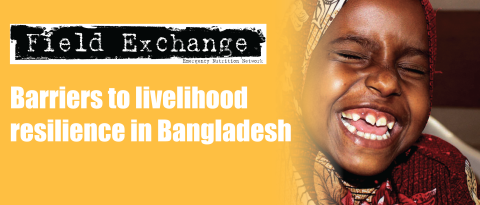Reaction to the article on the double burden of obesity and malnutrition in Western Sahara refugees
Dear editors
One of the key challenges that the nutrition community faces in this century is the double burden of nutrition. In many countries, it is found that acute malnutrition continues to pose a public health problem while overnutrition is becoming more and more of a problem as well. The article in the last issue of Field Exchange (No. 44, December 2012) on the study by Grijalva-Eternot et al1 shows that the problem of co-existence of obesity and malnutrition even appears to be present in a refugee camp setting.
The Sahrawi camps in the desert area in the far south-west of Algeria are one of the most protracted refugee situations worldwide that has existed for over 35 years. International support has always been provided on a ‘care and maintenance’ basis, with most of the funding going to the food and nutrition sector. As part of a recent consultancy assignment in the Sahrawi refugee camps, I looked into the findings of some key food and nutrition studies in the Sahrawi camps2.
These studies show that most Sahrawi refugees still depend on food aid, but that there actually is an unusually varied basket of food commodities. There is a full general ration distribution (2100 kcal p.p.p.d), complementary year-round distribution of rations of green tea and dried yeast, and a separate distribution system for fresh vegetables. An additional programme exists for provision of fresh foods during Ramadan. This is complemented by programmes for treatment of severe acute malnutrition (SAM), treatment of moderate acute malnutrition (MAM), supplementary feeding for pregnant/lactating women, targeted supplementary feeding for selected elderly and handicapped, distribution of NutriButter/micronutrient powder (MNP) in relation to the 1,000 days approach, and a school feeding prog-ramme.
It was shown in the studies mentioned above that the core of the diet is coming from food aid and the complementary nutrition programmes. The package is well-balanced in terms of nutrients. It is noteworthy that dietary diversity was rated to be sufficient. To some extent, this is because most refugees have access to additional food on top of what is provided through the aid agencies. This is through engagement in livestock keeping, bartering of food aid for other items, buying food in shops and on the market (using income from remittances and through daily labour), produce from small family gardens, and through sharing and other forms of social solidarity among relatives and neighbours.
In this situation, the ultimate solution to the problem of the double burden of malnutrition boils down to behavioural changes. The solution for addressing malnutrition among children lies in concerted intensive education campaigns on appropriate infant and young child feeding practices. Similarly, the problem of obesity and anaemia among women will have to be addressed through spreading information about what constitutes a healthy diet. Evidently, at some point in time, the Sahrawi will need to abandon their long-held tradition of fattening of women during periods of ritual overfeeding, reduce their excessive consumption of sugar, and find ways to build in low-intensity exercise in their daily life, even in a camp setting. However, as experience from elsewhere in the world shows, changing dietary and health practices is a difficult and long-term process that usually does not show quick results. In the meantime it will be necessary to continue the distribution of fortified food with various forms of micronutrient supplementation in the Sahrawi camps. Also, community based management of acute malnutrition (CMAM) is a service still required for treatment. I am not sure that we have an appropriate ‘quick fix’ in our nutrition toolkit for reducing obesity in non-Western settings?
Regards
Annemarie Hoogendoorn
1Grijalva-Eternod CS, JCK Wells, M Cortina-Borja et al (2012). The Double Burden of Obesity and Malnutrition in a Protracted Emergency Setting: A Cross-Sectional Study of Western Sahara Refugees, PLoS Med 9(10): e1001320. doi:10.1371/journal.pmed.1001320.
2DARA (2009). Evaluation of the DG ECHO assistance to the Sahrawi camps 2006-2008, http://ec.europa.eu/echo/files/evaluation/2009/Algeria_Final%20report_ESRC.pdf WFP/UNHCR/ENN (2011). Nutrition Survey Western Sahara Refugee Camps, Tindouf, Algeria, Survey conducted October-November 2010, report finalized April 2011. UNHCR/WFP (2012). JAM Algeria, Joint needs assessment of Sahrawi refugees in Algeria, 4-11 October 2011 http://documents.wfp.org/stellent/groups/public/documents/ena/wfp249728.pdf
Imported from FEX website


